13/11/2006
Genealogy of Thomas Hutchison and Eleanor Ann Mundie.
Hutchison family tree.
Mundie family tree.
| Thomas Hutchison - Company director. |
x |
Eleanor Ann Mundie. | |
| Born | 2 September 1881. | 8 September 1885. | |
| Place | Cruden, Peterhead. | Cruden, Peterhead. | |
| Died | 25 July 1965. | 10 November 1970. | |
| Place | Aberdeen. | Aberdeen. | |
| Married | 11 November 1913. | 11 November 1913. | |
| Place | Palace Hotel, Aberdeen. | Aberdeen. | |
| Ancestors | George Hutchison and Ann Sangster. | Peter Mundie and Ann Dow | |
| Siblings | 6 brothers, 2 sisters. | 3 brothers, 1 sister. |
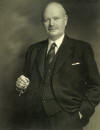 |
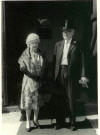 |
 |
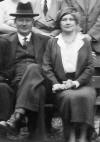 |
More photographs.
|
|||
| Ca1937 | Montreal 1949. | Golden wedding. 66 Hamilton Place, Aberdeen. 19 November 1963. |
Cliff House, Braemar. 15 Sept 1935. Complete photograph. |
||||
| Thomas Hutchison (2 September 1881 - 25 July 1965) was born
at the farm of Hardslacks of Cruden, sixth son and seventh child of George
Hutchison and Ann Sangster. TH had 54 first cousins - not an easy herd for the amateur genealogist to corral - while to this day, second and third cousins also identify themselves. Like all his siblings he attended Hatton school to the age of 14, when he assumed farming duties at home. A heavyweight athlete, he was practicing throwing the heavy hammer when he slipped and fell, injuring a vertebra. He spent 12 months in a plaster cast and a felt support, nursed by his sister Ann. His ruminations during that period influenced his career. He conceived a
steely hatred for the existing landlord/tenant system; having watched his
father waste his strength with the physical effort of clearing stones from
his fields, building walls, extending and improving cultivations, only to
have his rent increased to absorb most of the productivity gain. So, while many lairds and factors were numbered among his close friends, and he was regarded as an outstandingly able farming advisor nothing would persuade him to the life of a tenant farmer. Instead, he became an immensely energetic, outgoing and cheerful representative of the farm machinery industry to which he devoted the rest of his life. His brother William, older by four years, had for some time supplemented his income by selling, on commission, farm supplies such as fertilisers and feeding stuffs, and this experience led to him becoming a full time representative of Barclay, Ross & Tough, Agricultural Engineers and Seedsmen. WH recommended that his younger brother, Tom, be also engaged as a sales representative, and in 1902 this was agreed. Tom moved into lodgings with his brother at the home of Mrs Mitchell, at 10 St Devenick's Terrace, Cults, Aberdeen. He proposed to stay for three weeks and actually remained for 11 happy years. And what years they were! During that time, with the help of the Deeside Railway and his bicycle, later to be replaced by a succession of Ford Model "T" cars, he swept the whole of the Deeside farming community, lairds, factors and tenants, into the ambit of Barclay, Ross & Tough, winning many friends and loyal customers. Morrison Barclay died in 1906, and my impression is that TH borrowed £500 from his father's cousin Tom Hutchinson (sic) of Braemar to buy this interest in the business. Robert Tough died, I think about 1913, leaving Mr Robert R. Ross and TH as managers. On 19th November 1913 he married, in the Palace Hotel, Aberdeen, Eleanor Ann Mundie, also from Cruden, and so established a 50 year partnership which raised two of a family. They moved into 4 St Swithen Street, Aberdeen. The building was a low cost but effective conversion of the photographic workshop of the illustrious George Washington Wilson, whose business had collapsed after his death. One of the two upper apartments became the Hutchison home for 10 years. In 1924 the family moved - all of 200 yards - to 5 Gladstone Place, Aberdeen, where the two children - Tom and Eleanor - grew up and graduated from university. His back kept him a civilian during the war years 1914 - 1918, which he devoted to promoting improvements in farming practices - use of white clover and selected grass strains; selective breeding of swede and turnip seeds for his "Balmoral" range of seeds, application of internal combustion engines to replace muscle power, etc. The manufacturing facilities at Craigshaw works were applied to the production of new designs of implements and machinery. In 1920 the partnership was converted to a limited liability company - Barclay, Ross & Hutchison Ltd. During the1920's the business continued to grow and prosper
despite the depression in farming which inhibited progress greatly. However,
Mr Ross was keen to retire and a particularly attractive offer for all of
the shares from Imperial Chemical Industries, Ltd. was accepted. Te next few years were less than idyllic. SAI was not a well managed business. BR&H contributed a major proportion of the group's profits, albeit contriving to employ a high proportion of working capital to do so. Salaries were held down so that TH earned less than half his accustomed income while receiving little credit for his profit contribution and being castigated for using over-much capital. Nil desperandum! He acquired a mastery of the art of short-term trading on the stock exchange, to the extent that (perhaps to the chagrin of his senior colleagues) his income was much in excess of his salary. TH acquired, in 1937, the delightful "Drumgarth" house at Pitfodels, which became a byword for hospitality and good fellowship. Statesmen and civil servants; farmers and industrialists; academics and (particularly) students and graduates foregathered there. Weekend after weekend the crowded dinner table would be entertained to an endless succession of comic anecdotes about early days in farming and the card tables would giggle to snatches of forgotten music hall songs - "There's a hole at the bottom of the sea" "The village pump", "The green grass grew all round". No one ever heard the full version: only the key lines. The war years made severe demands. By now a leading figure in the farm supplies industry the fragility of Britain's food supply kept him away from home a great deal, entailing a punishing schedule of work, to the extent that by 1942 he was ordered to take 3 month's rest. That had a magical effect in restoring his energies which thereafter never flagged until his retirement. By this time there was a reconciliation with SAI and he became a director of the company in 1942. In 1946 his services to the nation were recognised by his appointment as an Officer of the Order of the British Empire. (OBE). For the next three years the world shortage of food and the excitement of the mechanical revolution in farming with the spread of tractors and combines kept him at the centre of affairs. "Drumgarth" remained busy though quieter with the departure of the younger generation. TH retired from business in September 1949 after 46 years' service to the farming industry, aged 67. He promptly set off on a glorious sweep across Canada and the USA where he was feted by the heads of the great international companies - International Harvester; Ford Motor Company; Massey Harris, etc., and lavishly entertained and cosseted by his nephews, nieces, in-laws and their families from Montreal to Los Angeles and back via Vancouver, Winnipeg and Toronto. Sadly, his retirement was not a success. He had been too single-minded for too long and he had lost his constituency. He interested himself in a variety of projects - He wrote a book on
"Machinery on the farm" - not greatly esteemed at the time but now accepted
as a minor, specialist classic. He had lost his touch in stock exchange trading and his stock brokers fleeced him mercilessly. The steady erosion of his wealth by economic mismanagement hurt him badly and entailed a progressive withdrawal from affairs. "Drumgarth", being now much too large for two elderly people, was sold in 1954, and the golden wedding in 1963 was celebrated in their comfortable apartment in Hamilton Place, Aberdeen, where they welcomed a steady stream of old and new friends. On 25th July 1965 he died in the Watson-Fraser nursing home, Aberdeen following a seven week series of largely unnecessary and ineffective operations. His funeral service was attended by some 1000 persons. Despite his keen application to business he had time for many voluntary roles: as trustee of his church; as secretary of the Royal Northern Agricultural Society; as a director of the Royal Highland and Agricultural Society; as honorary lecturer to the North of Scotland College of Agriculture; as vice president of the Chamber of Commerce. He also made several broadcasts about his familiar fields. Feet of clay? Let him who is without sin... TMH. December 2003. |
The Mundies are a mystery to me. Mother had one sister, Margaret Gatt (Aunty Gatty) who lived with us until she married Alex Jamieson in 1927 and went to Malawi where she died in 1929. Two brothers died young, but the third became a highly regarded accountant in Canada, Manager in Winnipeg of Uncle James Hutchison's firm - Riddell, Stead, Graham and Hutchison. The problem is that while Mother denied that she had any relatives other than those I've mentioned, the records show that she had at least four uncles and indeed I have met one of her cousins whose existence she denied. TMH. October 2003.
Mother For me the most important fact was that she was always there for me when
I was young. If I had a headache, a chesty cough, she always had an answer,
be it aspirin or a real fire lit in my bedroom. She was the solid foundation
in my life. I’m sure she must also have been a great help to father when he was
building up his business. For many years, before BR+H joined SAI, father
would often appear for lunch accompanied by a totally unexpected business
contact. A meal was always produced, and privacy to talk. I remember especially Aberdeen Agricultural; Show, when mother spent
hours making sandwiches which later appeared in the BR+H tent. The annual Christmas party for the staff was held at 5 Gladstone
Place…followed by dancing EIMH. May 2004. |
Children.
| ref | Name | Born | Died |
| 10 | Thomas Mundie | 26 Sep 1914 | 30 Jun 2006. |
| Eleanor Isabella Margaret. | 21 Jun 1916 | 7 Dec 2005. |
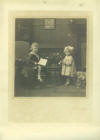 |
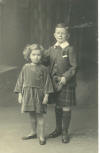 |
 |
||
| Ca 1919 | Ca 1921 - 1922 | Ave atque vale dinner 1934 |